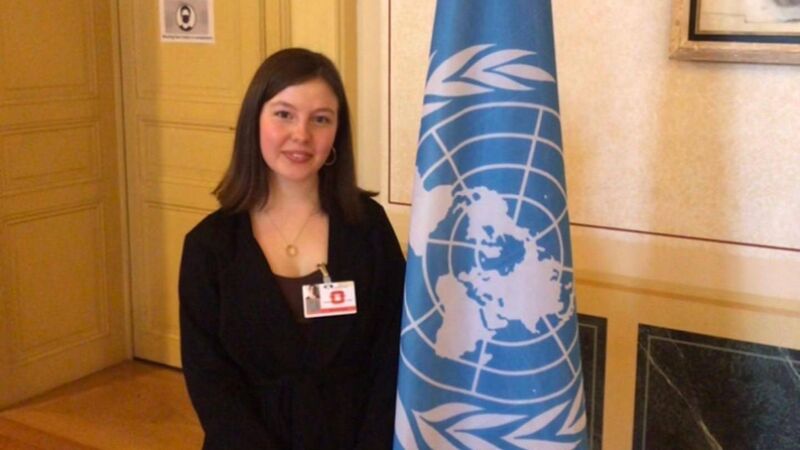Student to Student: We can learn from each other

Amy O'Brien, who will be penning our 10 part series, Student to Student, looking at study skills, career route options, Leaving Certificate reflections, school experiences and so on.
INSPIRATION BEHIND THE SERIES
Young people deserve to hear from the perspectives, opinions and experiences of other young people.
I believe we can learn from each other and help each other as we navigate the Irish education system.
I aim to draw from as many points of view as possible, making sure this advice is relevant to as many different students as possible.
The articles over the next 10 weeks will look at study skills, career route options, Leaving Certificate reflections, school experiences and so on.
ABOUT THE WRITER
My name is Amy O’Brien and I am an 18-year-old writer and advocate. I am entering 6th year this term and I’m interested in art, reading and social justice.
My experiences include being Cork County Comhairle na nOg (Youth Council) chair and now, the National Executive (the Cork youth representative at a national level).
I have organised with Fridays for Future internationally and represented the young people of Ireland at the United Nations (UN) Committee on the Rights of the Child to present the Ombudsman for Children’s Office (OCO) report ‘Pieces of Us’, having been on the OCO Youth Advisory Panel for two years.
I spoke at the University College Cork (UCC) Law Society House Meeting on Youth Activism, helped organise the Ombudsman for Children’s Office Beyond Limits 2022 (disability inclusion and empowerment event) and travelled to Glasgow for COP26 as Friend’s of the Earth Ireland’s Irish Delegate.
I hosted the Sustainable Sleepover Club podcast with a group of other young people, interviewing guests from a variety of backgrounds and discussing the United Nations Sustainable Development Goals as a blueprint for a fairer future.
Along with being involved with many more groups and actions for change, I have written opinion pieces for numerous newspapers and outlets.
SCHOOL EXPERIENCE TO-DATE
That’s a bit about me, but what about my time in school? I feel it is important to give you some context around my secondary school experience so far.
I completed 5th year this May and opted to do transition year the year previous. In 2nd year, I suddenly began attending school via my laptop like many students and did not sit a state-examined Junior Certificate due to the Covid 19 pandemic.
My Leaving Certificate subjects include, firstly, the compulsory ones, English, Irish, Maths, and then my choice subjects, History, Art, Biology and foreign language, German. I will sit my exams in these subjects next June.
STUDY ADVICE
In terms of practical study advice, I would start by urging you to simply listen in class and try to actually understand as many lessons as you can - it will make the inevitable ‘learning off’ much easier.
I find I retain a lot of information from writing out my own notes. It’s important to then cut down the course with diagrams, flashcards, highlighters and revision pages so you can focus on the content that comes up in exams the most. You can find out what questions and content is repeatedly asked by looking through exam papers, eg, utilising websites like Studyclix.
When it comes to sitting down and studying, my method is very simple but it works for me. I’ll read through my notes or whatever I’m trying to learn, cover it, rewrite it, correct it and do it again. This is a method I was taught as a little girl in primary school to learn off my spellings and it’s the main way I’ve studied since. The method involves you having to recall the information, reproduce it, and go through it again because you’ll have to correct and then highlight your mistakes.
Make your mistakes very obvious to you on the page, e.g. write them in with a red pen and repeat. Personally, I find I have to see the words on paper and tangibly identify what mistakes I’m making to improve and have the information sink in.
Other than that, ensure you feel free to ask the teacher’s advice and help if you need to as they are there to help you.
A lot of school is laid out for you, so in the aspects where you get to shape and decide what you study - choose what you enjoy.
When it comes to which subjects to pick or topics to opt for in the projects, go for ones you’re interested in if you can - it’ll just make your days more enjoyable.
This is my study skills advice, but I’m aware that every student is different and what works for me, may not work for you. However, I hope you find some of my advice useful.
BALANCE AND CONSISTENCY
Time is limited, you’ve just two years to study at least six courses, so I think the key to going through the Leaving Cert cycle truly is balance and consistency.
I can’t speak to my 6th year routine yet but in 5th year, I studied new content we covered in class that day the same night, so that I could consolidate the class straight away. I would do this after each subject’s homework and it built up to a couple of hours each night.
Except for coming up with exams, I left revision of past work for weekends.
I stuck to this consistently throughout the year and found that all that effort did build up, with the content staying in my memory.
DON’T FORGET DOWNTIME
For the sake of your studies, future aspirations, mental health and relationships, it’s vital to find time for friends, fun, relaxing, hobbies and school. To balance all that, though, you have to prioritise. What I mean by that is, you might have multiple hobbies or want to spend all evening doing your hobby and think that you’ll have no time in Leaving Cert for it at all. Rather than giving it up, find a bit of time in your evenings for your favourite pastime and perhaps wait to enjoy your other hobbies until the weekend or even term breaks and summer holidays. You’ll have significantly reduced the amount of time subtracting from homework and study whilst still incorporating doing what you enjoy into your routine.
Try to use this to look forward to your free time and put in the work while you’re at your desk. I feel this is important as it means you will feel more rested and focused during the periods you need to concentrate. I have found this to be true for meeting up with people, watching TV, getting out for a run or walk, work, reading, baking or cooking, writing and so on.
I hope you found the above useful. I enjoy learning and find school, though stressful, on the whole manageable, but every student faces and deals with it differently. In upcoming articles, I want to learn from a range of students who share their advice.
Next week: I chat to a student who is undertaking the Leaving Certificate Applied - a two-year Leaving Certificate programme aimed at preparing students for adult and working life.







 App?
App?




